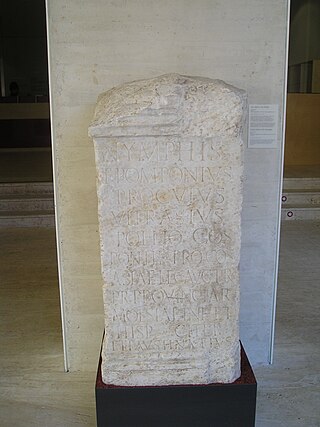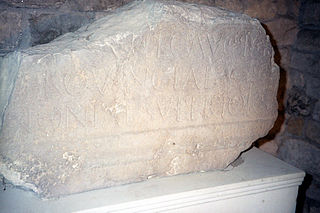Related Research Articles
Quintus Servilius Pudens was a Roman senator active during the second century AD. He was ordinary consul for the year 166 with Lucius Fufidius Pollio as his colleague, and he was proconsular governor of Africa around 180. Pudens is known only through surviving inscriptions.

Titus Pomponius Proculus Vitrasius Pollio was a Roman senator, who held several imperial appointments during the reign of Marcus Aurelius. He was suffect consul in an undetermined nundinium around 151; he was a consul ordinarius in the year 176 with Marcus Flavius Aper as his colleague.
Servius Cornelius Scipio Salvidienus Orfitus was the name of several Roman men who lived during the early Roman Empire. They were descendants of Orfitus who was adopted by Servius Cornelius Scipio, an otherwise unknown member of the patrician branch of the Cornelii Scipiones.
Gaius Aufidius Victorinus was a Roman senator and general of the second century. A friend of the Emperor Marcus Aurelius and the son-in-law of the advocate and orator Marcus Cornelius Fronto, he was twice consul and governor of several Roman provinces.
Publius Martius Verus was a Roman senator and general. He was twice consul. Verus played a major role in the suppression of the revolt of Avidius Cassius by remaining loyal to the emperor Marcus Aurelius.
Marcus Metilius Aquillius Regulus was a Roman senator of the second century AD. A member of the patrician order, he held the office of consul ordinarius in 157 with another patrician, Marcus Vettulenus Civica Barbarus, as his colleague.
Marcus Vettulenus Civica Barbarus was a Roman senator of the second century AD. A member of the Patrician class, he held the office of consul ordinarius in 157 with another patrician, Marcus Metilius Aquillius Regulus, as his colleague. Barbarus was also a member of the sodales Antoniniani, a religious fraternity which attended to the cult of the emperor Antoninus Pius.
Lucius Dasumius Tullius Tuscus was a Roman senator who was an amici or trusted advisor of the emperors Antoninus Pius and Marcus Aurelius. He was suffect consul in the nundinium of April to June 152 AD as the colleague of Publius Sufenas.
Marcus Peducaeus Stloga Priscinus was a Roman senator active during the middle of the second century AD. He was ordinary consul for 141 as the colleague of Titus Hoenius Severus. An inscription from the Great Theatre at Ephesus mentions a Marcus Peducaeus Priscinus as proconsular governor of Asia in 155/156, whom professor Géza Alföldy, amongst others, has identified as this Priscinus. Priscinus is known only through surviving inscriptions.
Lucius Titius Plautius Aquilinus was a Roman senator active during the middle of the second century AD.
Marcus Gavius Cornelius Cethegus was a Roman senator active during the middle of the second century AD. He was ordinary consul for 170 as the colleague of Gaius Erucius Clarus. Cethegus is best known for his behavior while travelling through Roman Greece, which provoked one person to call him a great fool, to which the philosopher Demonax replied, "Not great".
Marcus Gavius Squilla Gallicanus was a Roman senator active during the first half of the second century AD. He was ordinary consul for 127 as the colleague of Titus Atilius Rufus Titianus. Gallicanus is known only from inscriptions.
Marcus Pontius Laelianus Larcius Sabinus was a Roman senator and general who held a series of offices in the emperor's service. He was suffect consul for the nundinium of July-August 145 as the colleague of Quintus Mustius Priscus. Laelianus is primarily known through inscriptions.

Marcus Iallius or Jallius Bassus was a Roman senator, general, and literary figure who held several offices in the imperial service during the mid-second century AD. He was suffect consul around the year 159. Bassus is known primarily from inscriptions. His full name was Marcus Iallius Bassus Fabius Valerianus.
Lucius Pullaienus Gargilius Antiquus was a Roman senator, who held a number of offices in the imperial service during the reign of Antoninus Pius. He is known to have been a suffect consul in the early years of the reign of Marcus Aurelius, most likely in the year 162. He is known entirely from inscriptions.
Marcus Gavius Squilla Gallicanus was a Roman senator, who was active during the reigns of Antoninus Pius and Marcus Aurelius. He was suffect consul in 150 AD with Sextus Carminius Vetus as his colleague. He was also proconsular governor of Asia in 164/165.
Titus Vitrasius Pollio was a Roman senator, who held a number of offices in the imperial service. He was suffect consul around the year 137.
Titus Flavius Boethus was a Roman senator, who was active during the reign of Marcus Aurelius. He is known as being an acquaintance of the physician Galen. Boethus was suffect consul in one of the nundinia falling in the later half of 161 with [? Julius] Geminus Capellianus as his colleague.
Marcus Servilius Fabianus Maximus was a Roman senator, who was active during the reigns of Antoninus Pius and Marcus Aurelius. He was suffect consul in a nundinium in mid-158 with Quintus Jallius Bassus as his colleague. A native of North Africa, Maximus was the younger brother of Marcus Servilius Silanus, suffect consul in 152, and a relative of Quintus Servilius Pudens, brother-in-law of emperor Lucius Verus.
Marcus Cominius Secundus was a Roman senator, who was active during the reign of Marcus Aurelius. He was suffect consul in one of the later nundinia of 151 with Lucius Attidius Cornelianus as his colleague. He is known from inscriptions and military diplomas issued during his time.